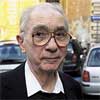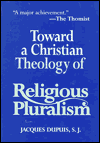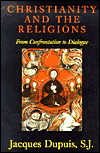
|
||
|
||
|
Friday, September 16, 2005
Further Reflections on Jacques Dupuis
 A "Theological Prophet" or the Triumph of Relevance Over Orthodoxy?: And How Catholics Often Handle Suspect Theologians - Justin Nickelsen has a good post expressing his concerns over the Congregation's handling of suspect theologians, with specific attention to the investigation and Notification concerning the late Fr. Jacques Dupuis (1923-2004), regarding his work Toward a Christian Theology of Religious Pluralism (Orbis, 1999). A "Theological Prophet" or the Triumph of Relevance Over Orthodoxy?: And How Catholics Often Handle Suspect Theologians - Justin Nickelsen has a good post expressing his concerns over the Congregation's handling of suspect theologians, with specific attention to the investigation and Notification concerning the late Fr. Jacques Dupuis (1923-2004), regarding his work Toward a Christian Theology of Religious Pluralism (Orbis, 1999).Justin provides an exerpt from In Many Diverse Ways--In Honor of Jacques Dupuis Orbis Books (October, 2003) by Cardinal Avery Dulles (who wrote the first chapter), expressing his personal appreciation for Dupuis. Noting as well the support of Gerald O'Collins and Fr. Peter-Hans Kolvenbach, Justin ponders: . . . Personally, the fact that these people, especially Dulles--whom I greatly respect as a theologian and as a man of the Church--have reservations about the process and application of Dupuis' notification produces a greater desire to understand just what it is that he was saying. Toward a Christian Theology of Religious Pluralism
. . . while noting the author’s willingness to provide the necessary clarifications, as evident in his Responses, as well as his desire to remain faithful to the doctrine of the Church and the teaching of the Magisterium, they found that his book contained notable ambiguities and difficulties on important doctrinal points, which could lead a reader to erroneous or harmful opinions. These points concerned the interpretation of the sole and universal salvific mediation of Christ, the unicity and completeness of Christ’s revelation, the universal salvific action of the Holy Spirit, the orientation of all people to the Church, and the value and significance of the salvific function of other religions. . . . The Commentary on the notification adds: . . . This Notification seeks to underscore the gravity and danger of certain statements which, while apparently moderate, precisely for this reason risk being easily and uncritically accepted as compatible with the Church’s doctrine, even by those closely involved in interreligious dialogue. In the present context of a society that is indeed increasingly multireligious and multicultural, the Church recognizes that she urgently needs to express her doctrinal identity and witness in love to her unshakeable faith in Jesus Christ, source of truth and salvation.Thus the focus is on the grave potential for misinterpretation due to the ambiguous nature of the subject matter involved, while acknowledging at the same time the author's sincere desire "to stay within the bounds of orthodoxy" -- and that, precisely, is the difference between Dupuis and wayward scholars like Paul Knitter and Roger Haight, neither of whom show concern about remaining faithful to Catholic tradition. Repressive Measures? While the Notification was merited, we can surely consider whether the manner in which the investigation was conducted is subject to improvement. Catholic journalist John Allen Jr. has followed the Dupuis investigation (as he has on all things Ratzinger) with very close attention. Following Dupuis' passing in 2004, Allen offered some personal criticisms of the Dupuis investigation, the subsequent document Dominus Iesus (seen very much as directed at the work of Dupuis), and its unanticipated consequences ("Remembering Jacques Dupuis" ("Word from Rome", National Catholic Reporter January 7, 2005): No doubt the result was both a blessing and a curse. On the one hand, it made Dupuis a worldwide celebrity, as a never-ending stream of speaking and writing invitations attest. Dupuis gained an audience for his ideas that might otherwise have eluded him. On the other hand, the lingering whiff of scandal meant that Dupuis remained under a cloud. His works were subjected to intense scrutiny, and in recent months he felt his Jesuit superiors had been under pressure to silence him. Dupuis' Subsequent work
On one hand, Georgetown U.'s Peter C. Phan ("Inclusive Pluralism" America Vol. 188 No. 3. February 3, 2003) describes it as "conceived as a more accessible version of its predecessor," composed during the period of his investigation by the Congregation, and with "careful attention to the objections brought forth by the C.D.F. as well as by his theological peers against his previous work." Phan praises the book as "a notable advance in Christian theology of religious pluralism," rooted in sound trinitarian Christology, traditional to the point where it could hardly be considered "innovative" at this point in time: [Phan] It must however be frankly acknowledged, with all due respect to Dupuis’s theological achievements, that inclusive pluralism is anything but avant-garde, much less beyond the pale of orthodoxy. Indeed, Dupuis acknowledges that the substance of his thesis has been affirmed by the Federation of Asian Bishops’ Conferences as far back as 1987. Dupuis unambiguously and repeatedly affirms Jesus’ role as the universal revealer and savior. He distinguishes between the economy of the Logos and that of the Spirit, but never separates them. While suggesting that other religions are “participated mediations” in the mediation of Jesus, he also unambiguously affirms the nature of the church as the sacrament of the mystery of salvation. While recommending interreligious dialogue for mutual enrichment, he firmly holds that the mutual complementarity between Christianity and other religions is asymmetrical—that is, the acknowledgment of the existence of “elements of truth and grace” in other religions does not cancel out the unsurpassed and unsurpassable transcendence of God’s self-manifestation in Jesus and Christianity. On the other hand, Gerald McDermott, an Episcopal priest and Professor of Religion at Roanoke College, describes Dupuis as "[registering] a subtle but resounding 'No!' to Cardinal Ratzinger and John Paul II," indicating elements of his later work that would in all likelihood merit further concern of the Congregation (Monastic Interreligious Dialogue Bulletin 70, March 2003): Dupuis claims the Christian tradition “never places Christ in the place of God” (88), cites approvingly an author who states that Jesus “never puts himself forward” (167), and holds that God not Jesus is at the center of Jesus’ proclamation (22)—all this without serious attention to countervailing texts such as Jesus’ claim to be the “way and the truth and the life” (John 14:6). In words that implicitly refute Ratzinger’s warning, Dupuis contends that “the working of the Word goes beyond the limits which mark the working presence of the humanity of Jesus even in his glorified state” (160). This, he explains, is because Jesus’ human consciousness was limited and did not exhaust the divine mystery. So the revelation in Jesus Christ was not exhaustive of the divine mystery (14). Nor is the Spirit always linked to the risen humanity of Jesus: if the Spirit was not “communicated through” the risen humanity of Jesus before the Incarnation, why need it be so now? (181). There is much more to McDermott's critical review, but this is sufficient to confirm that there was indeed something in Dupuis' approach and methodology which would warrant the attention of the Congregation. Anyone studying the subject of Christianity and religious pluralism and seeking, as Dupuis did, to remain within the bounds of orthodoxy will recognize that this is no easy task. I believe that ultimately, Toward a Christian Theology of Religious Pluralism will be recognized for its substantial treatment of these issues by a Catholic theologian who, in spite of certain weaknesses in his approach, nevertheless demonstrated great courage in navigating this rather difficult terrain in Catholic theology. I look forward to Justin's reading of his book and to further discussion of this most intriguing of subjects. Related Posts:
Related Documents on Fr. Jacques Dupuis In the Press...
Documents Pertaining To...
Labels: pluralism
|

Against The Grain is the personal blog of Christopher Blosser - web designer
and all around maintenance guy for the original Cardinal Ratzinger Fan Club (Now Pope Benedict XVI).
Blogroll
Religiously-Oriented
"Secular"
|
|















